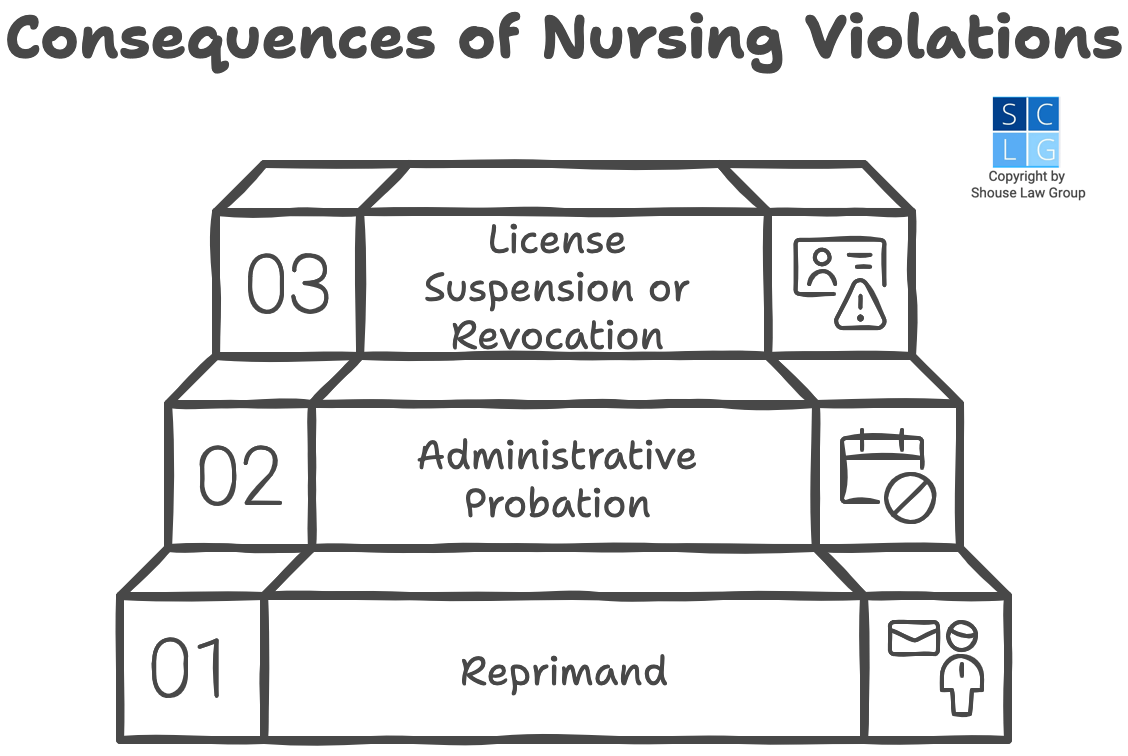The California Board of Registered Nursing (BRN) can discipline nurses convicted of certain criminal offenses. These include either misdemeanor or felony offenses that are “substantially related” to the qualifications and duties of a registered nurse (such as crimes involving fraud, theft, or violence).

As a registered nurse (RN) convicted of a crime, you are entitled to appear at an administrative hearing before the Board can impose sanctions.
The hearing is a mini-trial conducted before an administrative law judge. A lawyer from the California Attorney General’s Office represents the BRN. You can hire a defense attorney at your own expense.
The BRN can either accept the judge’s decision, modify it, or reject it.
Below our California criminal defense attorneys answer the following faqs re. nurses with criminal records.
- 1. Who regulates nurses in California?
- 2. When can the BRN discipline a nurse?
- 3. Do all criminal convictions trigger disciplinary action?
- 4. Can convicted nurses have an administrative hearing?
- 5. Can I become a nurse if I have a criminal record?
- Frequently Asked Questions
- Additional Resources
1. Who regulates nurses in California?
The California Board of Registered Nursing regulates registered nurses. The BRN is a state governmental agency within the California Department of Consumer Affairs.
The nine-member Board of Registered Nursing is charged with protecting the public in matters relating to nursing. In accordance with the Nursing Practice Act, the BRN:
- regulates nurse education and practice,
- grants registered nurses with RN licenses, and
- carries out disciplinary actions (for misconduct as well as criminal convictions (both felony and misdemeanor convictions)).
The BRN also runs a voluntary and confidential diversion program for nurses dealing with
- substance abuse,
- dependency on controlled substances, or
- mental health issues.
Completion of the program requires monitoring by the Board of Nursing for an average of three years.

“Unprofessional conduct” can trigger discipline.
2. When can the BRN discipline a nurse?
The Board of Registered Nursing can discipline you if you engage in unprofessional conduct.
“Unprofessional conduct” includes:
- incompetence or gross negligence,
- using drugs illegally or in a way that threatens the public,
- being convicted of certain kinds of crimes (but criminal charges alone are not enough for disciplinary action),
- engaging in certain kinds of fraud,
- being disciplined by a board in another state, and
- being careless with respect to blood-borne diseases.1
When it comes to actually imposing discipline on nursing providers, the BRN can:
- reprimand you,
- place you on probation, or
- suspend or revoked your California nursing license.2
Example: Marni is an RN who works at a hospital in Central California. Her supervisor notices that she is signing out controlled substances like Demerol and Morphine without a physician order. No patients seem to get the drugs.
Based upon these facts, Marni is allegedly engaged in unprofessional conduct in violation of Business and Professions Code Section 2762a, obtaining or possessing controlled substances without a prescription.
The hospital files a complaint with the BRN. The Board initiates disciplinary proceedings against Marni by sending her an accusation specifying the charges. Marni fails to return a notice of defense. The Board issues a default decision against Marni and revokes her registered nurse license.
Note that we will not ever know if the charges were actually true or not because Marni did not exercise her right to have a hearing and present evidence in her defense.
If Marni had pursued a defense, her case may have been resolved in a less severe way. For example, Marni might have been placed on probation or even had the charges dismissed.

Not all criminal convictions lead to disciplinary actions.
3. Do all criminal convictions trigger disciplinary action?
No. The BRN will only initiate disciplinary proceedings if you were convicted of a crime that is “substantially related” to the qualifications, functions, and duties of a registered nurse.3
Examples of such convictions include convictions for the crimes of:
- embezzlement,
- child abuse,
- spousal abuse,
- battery,
- theft from a patient or client, or
- failure to report abuse.4
The term “conviction” includes convictions secured through:
- guilty pleas and California jury trial verdicts (after judgment has been entered), and
- “no contest” pleas (after judgment has been entered).5
Example: Paul is a registered nurse in Los Angeles. He is convicted of elder abuse of his aunt as well as petty theft. Paul also is less than stellar on the job. On several occasions he has not washed his hands before and after drawing blood and he has been observed using the same needle for multiple blood draw attempts on the same patient. When Paul comes up for license renewal, he fails to disclose the convictions.
Paul can be disciplined by the Board of Registered Nursing and have his license revoked. Not only was he convicted of crimes substantially related to the practice of nursing, but he lied on his renewal application. His failure to follow proper blood draw protocol amounts to unprofessional conduct as well.
But now change the facts. Paul is an RN with an advanced practice certificate as a nurse anesthetist. He has worked in several hospitals without incident for the past eight years. In fact, he has received only positive evaluations and is well-regarded all around. One weekend afternoon Paul is stopped for speeding and issued a $100 speeding ticket.
Paul does not need to report this traffic infraction on his renewal application. The offense did not involve alcohol or a controlled substance, the fine was less than $300, and speeding is not substantially related to nursing.
Note that in general, entering a guilty plea as part of a deferred entry of judgment should not result in disciplinary proceedings or disqualification since the plea will be withdrawn as long as you complete all the court orders. Expunged convictions also should not have any negative effects (in most cases).

A nurse has the right to have an administrative hearing if they are subject to disciplinary action.
4. Can convicted nurses have an administrative hearing?
Yes. Once you are convicted of a crime, the BRN will begin an investigation into the matter.
If the Board finds that there is evidence suggesting disciplinary action, you may sometimes settle the case pursuant to a settlement agreement. If no settlement can be reached, you have a right to appear at an administrative hearing before the Board can take disciplinary action.
The hearing takes place at the Office of Administrative Hearings (OAH) and is similar to a criminal or civil court trial. An administrative law judge (ALJ) presides over the proceedings, and the Board is represented by a lawyer from the California Attorney General’s Office. You have the right to be represented by a criminal defense lawyer at your own expense.
During the hearing, the lawyer for the Board presents:
- evidence of the conviction, and
- reasons for why the judge should recommend discipline against you.
You present evidence on your own behalf. This includes evidence of rehabilitation and evidence of your criminal history. Your lawyer can also call and cross-examine witnesses.

Winning criminal trials is actually easier than winning administrative hearings.
The ALJ will likely recommend some disciplinary action if the Board can show, by clear and convincing evidence, that discipline is warranted. This is a lower burden of proof than the “by a reasonable doubt standard” used in California criminal trials.
The ALJ issues a Written Proposed Decision typically within 30 days after the hearing. The decision sets forth the ALJ’s recommendation as to disciplinary action. The Board can either adopt it, modify it, or reject it entirely.
If you lose the hearing, you can file an appeal with the Superior Court. You must file an appeal within 30 days of the effective date of the Board’s final decision.
If the Board suspends or revokes your nurse’s license and you lose on appeal, you can try to petition the Board for the reinstatement of your license.6
Character and Rehabilitation Evidence
During BRN proceedings, showing evidence of character and rehabilitation can significantly influence the outcome. Consider submitting:
- Letters of recommendation from employers, colleagues, supervisors, or community leaders.
- Documentation of participation in rehabilitation programs, therapy, or counseling.
- Proof of completion of probation or criminal penalties.
- Records of community service or volunteer work.
- Certificates for continuing education, especially in nursing ethics, law, or related areas.
Organize your documents clearly and include any evidence that demonstrates you have addressed the underlying issues and are fit for safe nursing practice.

Not all criminal records prevent getting a nursing license.
5. Can I become a nurse if I have a criminal record?
It depends on the nature of the offense committed and when the conviction occurred.
The Board of Nursing may disqualify you from becoming a nurse if:
- you have a criminal conviction within the past seven years from the date of your application for licensure, and
- the conviction was substantially related to the qualifications, functions, or duties of being a nurse (“substantially related” has the same meaning as discussed above in Section 3).7
Additionally, the Board of Nursing may disqualify you from becoming a nurse if you have a criminal conviction from any time for either:
- a crime for which you have to register as a Tier II or Tier III sex offender, or
- a serious felony, as defined in Section 1192.7 of the Penal Code.8
Examples of serious felonies under PC 1192.7 include:
- murder,
- rape,
- kidnapping,
- mayhem,
- forced sodomy, and
- assault with a deadly weapon.9

Registered nurses are regulated by the California Board of Registered Nursing.
Frequently Asked Questions
What types of criminal convictions can affect my nursing license in California?
Criminal convictions that are “substantially related” to nursing duties can affect your license. These include crimes involving fraud, theft, violence, child abuse, elder abuse, and drug offenses. Minor infractions like traffic tickets (under $300) typically do not impact your license.
How long does a criminal conviction stay on my nursing record?
Criminal convictions within the past 7 years from your license application date may disqualify you if they are substantially related to nursing duties. However, serious felonies and Tier II/III sex offenses can affect your license regardless of when they occurred.
What happens if the Board takes action against my nursing license?
You have the right to an administrative hearing before any disciplinary action. The hearing is conducted by an administrative law judge, where you can present evidence and have an attorney. The Board can then reprimand you, place you on probation, or suspend/revoke your license.
Can I still become a nurse if I have a past criminal record?
It depends on the nature and timing of the offense. Recent convictions (within 7 years) that relate to nursing duties may disqualify you. Serious felonies and certain sex offenses are permanent disqualifiers. Expunged convictions and successfully completed deferred entry judgments generally will not prevent licensure.
Additional Resources
For more information, refer to the following:
- National Nurses United – Nurses union with nearly a quarter-million members.
- Nurse Journal – Information hub for nurses and aspiring nurses.
- Nurses’ Guide to Mental Health Support Services – Information and resources by the American Psychiatric Nurses Association (APNA).
- American Nurses Association (ANA) – A national professional organization representing the interests of the nation’s 4 million registered nurses.
- Drug and Alcohol Rehab for Nurses Near You – Resources for nurses suffering from addiction or alcoholism, compiled by American Addiction Centers.
Legal References:
- State of California Board of Registered Nursing, “Recommended Guidelines for Disciplinary Orders and Conditions of Probation.
- See same.
- See State of California BRN website, “Disciplinary Actions and Reinstatements.”
- See same.
- See State of California BRN website, “License Discipline and Convictions.”
- State of California Board of Registered Nursing, “Recommended Guidelines for Disciplinary Orders and Conditions of Probation.
- See State of California BRN website, “License Discipline and Convictions.” See also Assembly Bill 2138.
- See same.
- California Penal Code 1192.7 PC.
